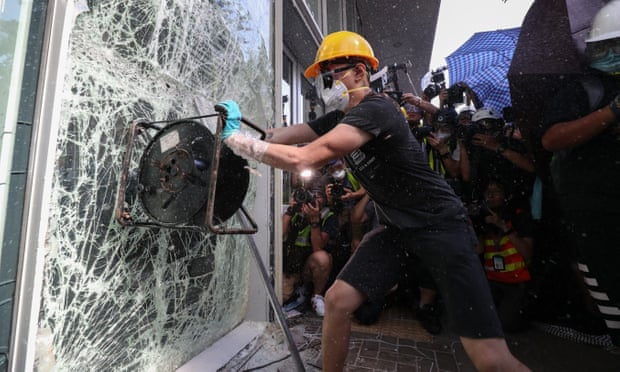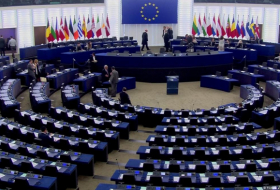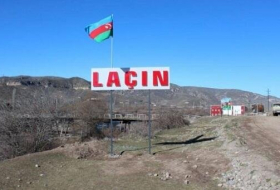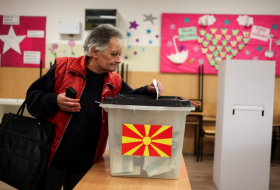Hundreds and perhaps thousands of anti-government demonstrators surrounded the legislature in the semi-autonomous city, while a handful of angry protesters repeatedly rammed a metal trolley and poles at the glass walls at the entrance on and off for several hours.
Protesters also took over key roads before what is expected to be a huge pro-democracy rally on the anniversary of Hong Kong’s handover to China.
The former British colony has been shaken by historic demonstrations in the past month in which protesters have demanded the withdrawal of a bill that would allow extraditions to the Chinese mainland.
Dozens of riot police were stationed inside the legislative building in full protective gear, watching on as the glass cracked but did not shatter. Officers occasionally sprayed pepper spray through the cracks to deter the protesters.
At one point, about half a dozen pro-democracy and independent lawmakers came between the demonstrators and police, and called for calm.
They pushed against the trolley, acting as human shields between it and the building. They were roughly handled by dozens of young protesters, some of whom punched and pulled their arms. They were shouted down and protesters continued pounding the glass.
“They simply wouldn’t listen to me,” said Lam Cheuk-ting, one of the lawmakers. “The movement at large is peaceful, but some young people are overwhelmed by a strong sense of helplessness and they’re emotionally charged.”
The police called on organisers of a march to consider rescheduling or shortening it, but it left just before 3pm when tens of thousands began snaking their way through the city.
The organisers, the umbrella group the Civil Human Rights Front, did change the end point of the march. Marchers who carry on beyond the approved march route could potentially be charged with illegal assembly under Hong Kong law.
Police issued a statement earlier saying they “absolutely” respected people’s right to “assembly, procession and expression of opinion in a peaceful and orderly manner”, but that there was “a serious safety threat” in the Admiralty and Wan Chai areas of the city, and advised the public to carefully consider whether they should join the public procession.
It is unclear whether the numbers will match the organiser-estimated 2 million who took part in a rally against the extradition bill.
Police were relatively restrained on Monday despite the damage to the legislature, having come under fire for excessive force during a smaller protest on 12 June.
China reiterated its stance against what it called “foreign interference” in Hong Kong.
Speaking in Beijing, the Chinese foreign ministry spokesman Geng Shuang said the UK’s rights and obligations under the joint declaration on the 1997 handover of Hong Kong had ended.
“Britain has no so-called responsibility for Hong Kong. Hong Kong matters are purely an internal affair for China. No foreign country has a right to interfere,” Geng told a daily news briefing.
“Recently Britain has continuously gesticulated about Hong Kong, flagrantly interfering. We are extremely dissatisfied with this and resolutely opposed.”
Earlier in the day the chief executive of Hong Kong, Carrie Lam, attempted to calm the mood, as an official ceremony took place at a convention centre in Wan Chai to mark the 22nd anniversary of the handover.
In her speech Lam referred to the protests, saying they had made her realise “the need to grasp public sentiments accurately”. She said: “I am also fully aware that while we have good intentions, we still need to be open and accommodating.”
The ceremony was held inside.
The rallies are the latest manifestation of growing fears that China is stamping down on the city’s freedoms and culture with the help of the finance hub’s pro-Beijing leaders.
Although returned to Chinese rule in 1997, Hong Kong is still administered separately under an arrangement known as “one country, two systems”.
The city enjoys rights and liberties unseen on the autocratic mainland, but many residents fear Beijing is already reneging on that deal.
If huge crowds gather on Monday evening, as expected, it will be the fourth mass anti-extradition bill protests in five weeks.
While the protests were initially sparked by Lam’s attempts to pass the proposed legislation, the demonstrations have morphed into a wider movement against her administration and Beijing.
More about: #HongKong
















































